Duck Camp on Wheels
The ability to socially isolate while following the ducks has made recreational vehicles one of the hottest trends in waterfowling
The ability to socially isolate while following the ducks has made recreational vehicles one of the hottest trends in waterfowling
By Chris Jennings, Photos by John Hoffman
I have always admired Terry Redlin's art. A typical work by this beloved heartland artist might depict a rustic cabin overlooking a pristine, hardwood-lined lake or marsh. There may be a duck skiff tied haphazardly to a dock, smoke curling up from a stone chimney, and a flock of mallards or Canada geese cruising overhead against a fiery red sunset. While these picturesque scenes undoubtedly represent the ideal duck camp setting for many waterfowlers, I have always valued the ability to go where the hunting is best. For me, the best duck camp is one that I can take with me. And for that purpose, there is no better option than a recreational vehicle.
A few years ago, with the full support of my wife, I found the perfect mobile duck camp: a 2010 Winnebago Adventurer 35Z. Luckily, I scored my duck camp on wheels before the pandemic struck, and believe me, it has paid dividends. Following is an account of a recent waterfowl hunting trip I made in my RV as well as some handy tips that I learned along the way.
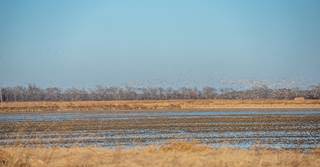
We tossed our shotguns, ammunition, waders, blind bags, food, and piles of miscellaneous gear into the Winnebago as it sat idling in my driveway on a late afternoon in December 2019. The plan was for my hunting partner Landon Simmons and me to spend four days hunting in three statesArkansas, Missouri, and Kentuckywhere we had invitations to other hunters' camps. Local hotel accommodations were readily available, but after using the Winnebago all spring and summer with my wife and two daughters, I decided to take the RV instead. Our wives stood in my driveway bidding us farewell as I released the parking brake and slowly made the wide right turn out into the street.
Less than 50 yards out, I came to a stop. Somehow, the RV's hitch-mounted equipment rack had clipped the Christmas decorations lining my driveway, and our wives looked on with a combination of horror and amusement as we dragged 25 feet of lights and plastic candy canes down the street behind us. It wasn't the sendoff that we had anticipated. This driving hazard is known as tail whip among RV owners, and it made for a solid first lesson on our journey.
Pulling out of Memphis, I pointed the rig westward and soon we crossed the I-40 bridge over the Mississippi River into Arkansas's famous duck country. The drive produced laughs, plenty of duck talk, and enough excitement to make it feel like we were already at camp.
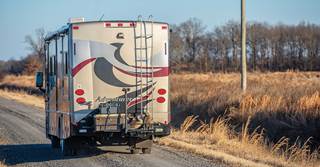
A true mobile duck camp should be fully self-sufficient, meaning that it can be set up just as easily in a farmer's lot with no water or electricity as it can be at an RV park or campground with full hookups (50-amp power, water, and sewage). My rig can carry 90 gallons of water and comes with an Onan 5500 generator for electricity and a 28-gallon propane tank to run the refrigerator, water heater, cooking appliances, and furnace. A digital TV antenna offers a surprisingly strong signal even off the beaten path, and a full bathroom with a spacious shower rounds out the amenities. Planning to camp without hookups and relying only on a generator is considered primitive camping by many RV enthusiasts, but make no mistake, we were far from roughing it.
Our first stop was a farmer's gravel overflow equipment lot outside Stuttgart, Arkansas, within sight of a farm where we had permission to hunt. The RV's hydraulic, push-button leveling system made setup a breeze. Relaxing in lawn chairs under the awning, we watched skeins of ducks and geese crisscross the sky over Arkansas's Grand Prairie, silhouetted against a burnt-orange sunset. It was a scene, I mused, worthy of a Terry Redlin painting. The aroma of a premade pasta dish baking in the RV's convection oven drifted through the screen door, mixing with the odors of mud and decomposing rice stubble. Welcome to duck camp.
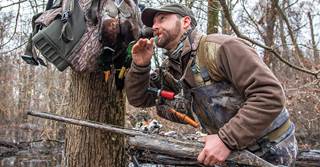
The first morning in Arkansas far exceeded our expectations as mallards whiffled through the flooded oaks in a greentree reservoir on the farm. Our original itinerary had us leaving the Natural State after the first day's hunt, but we couldn't pass up the opportunity for at least one more morning in the timber. With no reservations to cancel, we decided to extend our stay in Arkansas. I made a few phone calls and bumped Missouri off the agenda. We spent the next two mornings in the timber and the afternoons attempting to yodel whitefronts into the surrounding rice stubble. The best part was that I could see my RV from the fields. My duck camp was literally a stone's throw away.
Having the flexibility to go or stay as long as I please is exactly why I made the decision to buy the RV in the first place. On our last evening in Arkansas, we relaxed, reliving those feet-down mallards, and then processing the day's birds, storing them on ice, and packing up for an early-morning exit.
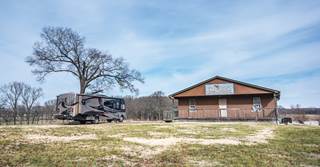
Photo Seth Dortch Creative
We were scheduled to hunt with Kelley Powers, world goose calling champion and co-owner of Final Flight Outfitters, in Kentucky. A quick phone call and a digital map pin drop gave us a heading, and we fired up the motor to head for our next stop, another gravel lot adjacent to Powers' duck camp.
The drive was a little over four hours. Shortly after we arrived at our destination, Simmons whipped up a delicious batch of duck gumbo with some of the mallards that we had harvested in Arkansas. The convenience of having a complete mobile kitchen is a game changer on extended waterfowling junkets. A full stovetop with three burners is more than enough to cook a five-star feast, and the combination convection oven and microwave mounted above the stove provides options for baking, roasting, or reheating.
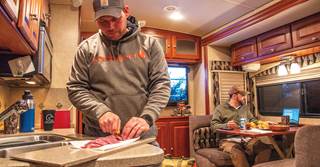
Typically, we spend the majority of our time at duck camp outside, but I appreciate having the option to retreat indoors in inclement weather and at night. My RV has a king-sized bed in the rear bedroom, two bunks that can also be used as a wardrobe, and a couch that folds down into a queen-sized bed near the front of the vehicle. The RV can sleep up to eight, so having only two people on our trip offered ample space for each of us.
That night brought a stiff north wind with temperatures dipping into the mid-20s. We stayed inside the RV enjoying the gumbo, discussing the trip, and sharing our expectations for the next morning's hunt. It was a great example of how the RV's indoor space can serve as a comfortable living area while on the road. The basement heater kept the interior a cozy 70 degrees as the wind whipped around us and we swapped hunting stories.
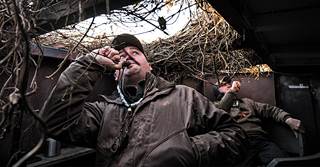
Photo Seth Dortch Creative
The next morning, we enjoyed a fantastic hunt with Powers and his crew as huge flocks of mallards following the river peeled off and worked our massive decoy spread set in a willow-lined backwater. Following the hunt, we returned to the RV for a quick meal. Simmons, always on call as a small-business owner, received the kind of trip-ending phone call that every duck hunter dreads, forcing us to pull up our proverbial stakes and head back to Memphis. We stowed our gear, closed the three slides, unleveled, and fired up the coach in a matter of minutes.
While our trip didn't go exactly as planned, my mobile duck camp proved to be as capable and comfortable as I'd hoped. Traveling by RV is a fantastic way to explore the flyways while still enjoying many of the comforts of home. Following that first trip, I immediately turned my attention to locating RV parks, campgrounds, and suitable overnight parking areas in Illinois, Missouri, Iowa, and Nebraska. The spring light goose migration would begin soon, and I planned to follow the birds north at 65 miles an hour.
Following the COVID-19 outbreak in early 2020, the thought of sharing a crowded duck camp with others had hunters scrambling to adjust their fall plans. Recreational vehicles immediately became a viable option, providing the social isolation and mobility necessary to keep hunting trips on the books. The fall 2020 RV RoadSigns report prepared by ITR Economics for the RV Industry Association estimates that 507,200 units will be delivered in 2021, a 19.5 percent increase over 2020. This would break the record for RV deliveries in the United States, eclipsing the 504,600 units shipped in 2017.
The search for a mobile duck camp can be a challenge, as demand for both new and used RVs is high. I looked for nearly three years before choosing the Winnebago I own today. I was in the market for a class-A motorhome, but fifth wheel and bumper-pull campers have advantages as well. Consider all available optionsstyle, model, layout, and chassis, among othersand select the vehicle that will best meet your needs. A great resource for RV research is available online at GoRVing.com.
Ducks Unlimited uses cookies to enhance your browsing experience, optimize site functionality, analyze traffic, and deliver personalized advertising through third parties. By continuing to use this site, you agree to our use of cookies. View Privacy Policy